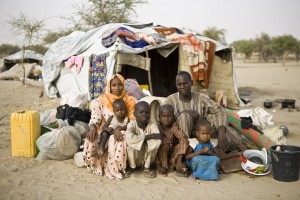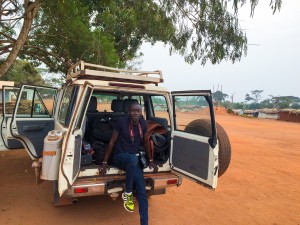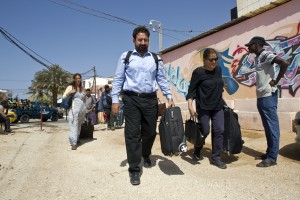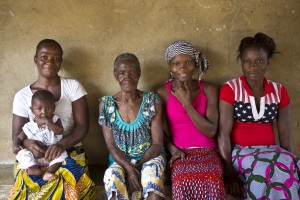Nigerian boys tell of Boko Haram abduction
Children in northeast Nigeria continue to pay a heavy price for violence committed by the militant group
FAR NORTH REGION, CAMEROON, April 14 (UNHCR) – Paul and his younger brother Adam resisted with all their strength when several armed men from the Boko Haram sect burst into their house in their village, located in Nigeria’s Borno State, and dragged them outside. “They ended up lifting us up and threw us in a car. They handcuffed us, and we remained like that for a day” remembers Paul from the Minawao camp, in Cameroon’s Far North region, where he is now a refugee with his brother and mother. “Our abduction happened almost three years ago but it feels as if it happened yesterday,” he added.
With the two boys handcuffed on the back seat, the car drove towards the Sambisa forest, one of Boko Haram’s strongholds bordering Cameroon. The abductors quickly asked the family for a ransom of 20 million nairas (or US$100,000) for the release of Adam and Paul, then 12 and 14, or they would be killed. In the forest, the brothers, who are Christians, were forced to convert to Islam. Paul remembers that his kidnappers kept screaming: “We will cut your throat if you don’t convert.”
On the second day of their captivity, the boys were forced to stand against a mud wall. Boko Haram militants trained their Kalashnikovs on their backs and threatened again to kill them. “Then they dragged us to a well and I thought they would throw us in, but they just wanted to scare us and they finally brought us back under the tree where we had been sleeping the past night,” Paul recalls.
With no blankets to keep warm at night, little food to eat for several days and the constant threats of execution, the two boys kept thinking they would die. “We were often crying. We were cold. We were thinking how much we missed home and our mother,” Paul said. The two boys were told they would soon be trained to become fighters – a fate that they would in fact escape. Unknown to them, negotiations were underway between the boys’ uncle and one of the leaders of Boko Haram in Borno State, and they were finally released after seven terrifying days.
Hundreds and possibly thousands of children have been abducted in Nigeria since 2013, when Boko Haram stepped up their insurgency. The spectacular kidnapping of 276 girls in Chibok, in Borno State, on April 14 two years ago made headlines all over the world and generated unprecedented social media engagement (see #BringBackOurGirls). Some 50 of the girls managed to escape in the following hours and days of the brutal kidnapping, although the fate of the others remains unknown.
Abductions of girls and boys had been happening long before that high-profile incident and still occur on a regular basis. Schools and dormitories have been raided regularly in north-eastern Nigeria by armed men. Boys are kidnapped for recruitment into the sect’s ranks while abducted girls will be exposed to forced marriage, sexual exploitation and abuse.
Some families have escaped to neighbouring countries for more safety and as a preventive measure, although kidnappings of children have also been reported in Cameroon, Chad and Niger. In the past year, girls have also been used more and more to carry out suicide bombing attacks. “Being kidnapped or being a victim of violence are life-threatening events that trigger huge anxiety and distress. It will impact enormously on the emotional world of any child,” says Caroline Schmidt, UNHCR Regional Education Officer for West Africa and the Nigeria situation, based in Dakar.
In refugee camps in West and Central Africa, UNHCR, the UN Refugee Agency, and its partners have implemented activities that support boys and girls who have experienced violence or abuse, and have suffered during their flight or have been separated from their families. They receive special assistance, including psycho-social support and access to child-friendly spaces. UNHCR also trains and supports teachers to ensure that schools are safe and protective spaces where refugee children and young people can regain a sense of normalcy, such as in camps hosting Nigerian refugees. It is hoped that a safe environment such as the ones provided through schools in refugee camps and host communities will enable children and youths to have a positive outlook on the future.
“We are refugees now in Cameroon, and we feel safer. I miss my home in Nigeria, my village and my friends,” Paul said, noting the still ongoing insecurity in his homeland. “But I am still afraid of going back there and possibly meet with the men who abducted me.”

Fifteen-year-old Mariam is alone in a refugee camp in Cameroon. She remains traumatised after Boko Haram men murdered her father and abducted her mother, her sisters and brother. “I am from Madagali, in Adamawa State. I left because of Boko Haram. I saw several armed men walking towards my home one day in November 2014, early morning. I only had a few seconds to run and hide behind food bags in our stable. They abducted my mother, my five sisters and one brother. I could hear the screams of my mother and siblings. They did not find me. They were wearing khaki T-shirts and had Kalashnikovs. They left with my family in several cars. Before coming to my home, Boko Haram had first gone to the school of the nearby village where my father was teaching, and they killed him. After the kidnapping, I could not sleep, I was afraid, I decided to go to northern Cameroon to be with my grand-mother and grand-father who live there. Then I decided to go to a refugee camp as it was too crowded at my grand-parents’, we were ten in a small room. I keep thinking of my mother, my sisters and brother. I have no news of them since they were kidnapped”. UNHCR/ Helene Caux
Des enfants nigérians témoignent de leur enlèvement par Boko Haram
Au nord du Nigéria, les enfants continuent de payer un lourd tribut à la violence commise par le groupe militant
REGION DE L’EXTREME-NORD, CAMEROUN, 14 avril (HCR) - Paul et son jeune frère Adam ont résisté de toutes leurs forces, quand plusieurs hommes armés de la secte Boko Haram ont fait irruption à leur domicile dans leur village situé dans l'Etat de Borno au Nigéria, et les ont traînés hors de la maison. "Ils ont fini par nous soulever et ils nous ont jetés dans une voiture. Puis ils nous ont menottés et nous sommes restés comme ça durant une journée", se souvient Paul qui témoigne depuis le camp de Minawao, dans la région de l'Extrême-Nord au Cameroun où il est désormais réfugié avec son frère et sa mère. "Notre enlèvement est survenu il y a près de trois ans, mais c’est comme si c’état hier", ajoute-t-il.
Les deux garçons étaient toujours menottés sur la banquette arrière, quand la voiture s’est dirigée vers la forêt de Sambisa, l'un des bastions de Boko Haram à la frontière avec le Cameroun. Les ravisseurs ont rapidement demandé à la famille une rançon de 20 millions de nairas (soit 100 000 dollars US) pour la liberation d'Adam et Paul, alors âgés de 12 et 14 ans, ou ils seraient tués. Dans la forêt, les deux frères, qui sont chrétiens, ont été forcés de se convertir à l'Islam. Paul se souvient que ses ravisseurs criaient sans cesse : "Nous allons vous couper la gorge si vous ne vous convertissez pas."
Le deuxième jour de leur captivité, les garçons ont été contraints de rester debout contre un mur de boue. Des militants de Boko Haram ont pointé leurs Kalashnikovs dans leurs dos et ont à nouveau menacé de les tuer. "Ensuite, ils nous ont traînés vers un puits où je pensais qu'ils allaient nous jeter, mais ils voulaient juste nous faire peur... Ils nous ont finalement ramenés sous l'arbre où nous avions dormi la nuit précédente", se souvient Paul.
Sans aucune couverture pour se tenir au chaud durant la nuit, avec peu de nourriture pendant plusieurs jours et des menaces constantes d'exécution, les deux garçons ne cessaient de penser qu'ils allaient mourir. "Nous pleurions souvent. Nous avions froid. Nous pensions à quel point notre maison et notre mère nous manquaient", explique Paul. Les deux garçons ont été informés qu'ils seraient entraînés à devenir des combattants – ce à quoi ils ont en réalité échappé. Ceci car, à leur insu, des négociations étaient menées entre leur oncle et l'un des leaders de Boko Haram dans l'Etat de Borno. Les deux garçons ont finalement été libérés après sept jours terrifiants.
Des centaines, voire des milliers d'enfants, ont été enlevés au Nigéria depuis 2013, lorsque Boko Haram a intensifié ses insurrections. L'enlèvement spectaculaire de 276 jeunes filles à Chibok, dans l'Etat de Borno, le 14 avril 2014 avait fait la une des journaux à travers le monde et avait généré un engagement sans précédent dans les médias sociaux (voir #BringBackOurGirls). Environ 50 de ces jeunes filles avaient réussi à s’échapper dans les heures et les jours qui avaient suivi cet enlèvement brutal. Toutefois le sort de dizaines d’autres demeure inconnu.
Des enlèvements de jeunes filles et de jeunes garçons avaient commencé et se produisaient régulièrement bien avant cet incident largement relayé dans la presse. Au nord-est du Nigéria, des écoles et des dortoirs ont été régulièrement attaqués par des hommes armés. De jeunes garçons ont été enlevés à des fins de recrutement dans les rangs de la secte, tandis que les jeunes filles enlevées sont exposées au mariage forcé, à l'exploitation sexuelle et à diverses formes drabs. Certaines familles ont fui vers les pays visions à la recherche de plus de sécurité, ou comme mesure préventive. Toutefois, des enlèvements d'enfants ont également été signalés au Cameroun, au Tchad et au Niger.
Depuis l'année dernière, des jeunes filles sont également de plus en plus utilisées pour mener des attaques suicides. "Etre enlevé ou être victime de violence sont des événements qui mettent votre vie en danger , et qui déclenchent de profonds sentiments d’anxiété et de détresse. Cela aura un impact énorme sur la sphère émotionnelle d'un enfant", indique Caroline Schmidt, fonctionnaire du HCR, basée à Dakar, en charge de l'éducation pour la région de l'Afrique de l'Ouest et la situation au Nigéria.
Dans les camps de réfugiés en Afrique centrale et de l’Ouest, le HCR, l'Agence des Nations Unies pour les réfugiés, et ses partenaires apportent un soutien aux jeunes garçons et aux jeunes filles qui ont été victimes de violence ou d'abus, qui ont souffert quand ils se sont enfuis ou qui ont été séparés de leurs families. Ils reçoivent une assistance spécifique, y compris une aide psycho-sociale et l'accès à des espaces adaptés pour les enfants. Le HCR forme et apporte un appui aux enseignants afin que les écoles soient des espaces sûrs et protecteurs où les enfants réfugiés et les jeunes puissent également retrouver un sentiment de normalité, comme cela est le cas dans les camps accueillant les réfugiés nigérians. Il est à espérer qu'un environnement sûr, comme ceux fournis par les écoles dans les camps de réfugiés et les communautés d'accueil permettra aux enfants et aux jeunes d'avoir un regard positif sur l'avenir.
"Nous sommes désormais des réfugiés au Cameroun et nous nous sentons davantage en sécurité. Le Nigéria, mon village et mes amis me manquent " déclare Paul, en évoquant l'insécurité persistante dans son pays natal. "Mais j’ai toujours peur d'aller là-bas et de rencontrer peut-être les hommes qui m’ont enlevé."




















